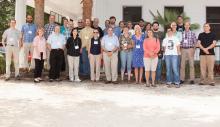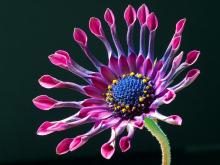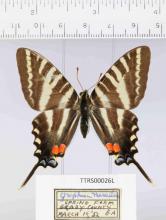Workflow
Georeferencing: The Polygon Method
Georeferencing: The Polygon Method - a guest blog by Michael Yost, Macrofungi Collection Consortium (MaCC) Project Assistant at the Denver Botanic Gardens and active member of the iDigBio GWG.
iDigBio’s Paleo Digitization Workshop Draws more than 60 Attendees to New Haven
More than 60 paleontologists representing 41 institutions assembled in New Haven, CT the week of September 23rd, 2013 to share ideas, protocols, preferences, and strategies. This was iDigBio’s most populous workshop to date, with an assortment of excellent presentations and ample opportunities for rich discussion.
Advanced GEOLocate Course - Services, Integration, End-to-End Workflows
On Friday, September 6th, Nelson Rios from Tulane University and the FishNet2 project, presented a lecture covering advanced use of GEOLocate software and services available through the web-based Application Programming Interface (API). Using Adobe Connect meeting software, over 30 people came to find out what they can do with GEOLocate tools and services beyond the online public user-interface. The recorded meeting was IT-oriented, but those new to "just what is a service?" were also welcome. Many of the participants were from the recent iDigBio 2nd Train-the-Trainers Georeferencing Workshop and they were eager to pick-up where the TTT2 GEOLocate material ended. (TTT2 Workshop) (TTT2 Blog)
Entomologists Gather for Insect Digitization Workshop in Chicago
Chicago’s Field Museum of Natural History (FMNH) turned out to be the perfect venue for iDigBio’s April 23–25 (2013) Dried Insect Digitization workshop. Overlooking Grant Park and the Chicago lakefront, FMNH provided an exceptionally attractive and hospitable environment with outstanding amenities. About 50 entomologists and digitization professionals from the U.S., Australia, and the United Kingdom attended, bringing together a diverse assemblage of knowledge and skill to address the complex job of digitizing pinned insect collections.
Hackathon and iConference Update Part II
iDigBio Augmenting OCR Working Group provides a detailed update on the recent Hackathon and presentations at iConference 2013, held in Forth Worth, TX, February 12-15.
Workflow Modules and Task Lists
One outgrowth of the DROID (Developing Robust Object-to-Image-to-Data) workflow workshop held in May 2012 was the establishment of a series of working groups, each focused on workflow modules and tasks for various preparation types. The first of these groups, informally called the Flat Sheets and Packets Working Group, was charged with fleshing out task lists for digitizing vascular and non-vascular plant collections. The second group, Pinned Specimens in Trays and Drawers, is investing its time developing modules to support effective entomological digitization workflows. Other preservation types will follow, concluding with the development of an overall project management module designed to provide guidance for developing and managing digitization projects across disciplines and preservation types.
Seeking Effective Efficient Digitization - ZooKeys Publishes iDigBio's 5 Task Clusters
All of us at iDigBio are excited to announce the publication of Five Task Clusters that Enable Efficient and Effective Digitization of Biodiversity Collections in a ZooKeys 209:19-45 (2012) Special Issue No specimen left behind: mass digitization of natural history collections. We look forward to your comments...
Digitization Workflows
Efficient and effective workflows are at the heart of successful biological and paleontological collections digitization. Much work has been done with developing workflows and protocols at the museum and collections level, but few of these workflows have been documented or made available to the larger collections community. iDigBio, through its Documentation pages, is establishing an online repository for sharing existing customized workflows from as many collection types and institutions as possible, an idea that stems largely from the Developing Robust Object-to-Image-to-Data (DROID) workshop held May 30-31, 2012. We have assembled an initial set of workflows, including selected examples from the DROID workshop, as well as those developed by iDigBio staff. Here we offer the beginnings of the repository and encourage those in the community to both discuss the workflows via the forum links, and to contribute to this resource by adding new workflows and updating existing workflows.
Digitization Workflow Workshop Report
Members of the collections community gather in Gainesville, FL to produce optimized specimen digitization workflows at the Developing Robust Object-to-Image-to-Data (DROID) Workshop. Tremendous participant insight holds the promise for informative documentation that will benefit all collections conducting or initiating digitization activities.
Slide-Scanning Protocol
Protocols for Slide-Scanning/Digitization of Standard Microscope Slides
iDigBio Botany 2012 Digitization Workshop - Open Registration
Registration is open for the Specimen Digitization Tools and Practices Workshop at the Botany 2012 Conference. The workshop will introduce current and future biological and paleontological specimen collections staff to resources and workflows that can lead to greater efficiencies in the digitization of their collections. The workshop will be held from 8:00 AM – 5:30 PM on Thursday, July 12, the day after the conference at the conference facility. Note: you do NOT have to attend the conference to attend the workshop.
Workshop for Developing Robust Object to Image to Data (DROID) Workflows
It is our pleasure to announce the Developing Robust Object to Image to Data Workflows (DROID) Workshop to be held at the University of Florida in Gainesville, FL. The workshop is designed to identify existing optimal digitization workflows, as well as process and technology gaps that must be bridged in order to achieve the scope of digitization required to meet the Grand Challenge. The workshop is co-sponsored by Integrated Digitized Biocollections (iDigBio) and Software Infrastructure for Sustained Innovation (S2I2). It will be held on May 30th and May 31st. Additional details may be obtained from the workshop overview.
Up to five participant slots are available for applicants. Accepted participants will be provided with travel, lodging and meals to attend the workshop.
Streamlining Collaborative Digitization
Streamlining Collaborative Digitization: How to order and install multiple digitization work stations
By Melissa Tulig and Kimberly Watson
Workshop and Symposium at Botany 2012
It is our pleasure to announce the Specimen Digitization Tools and Practices Workshop at the Botany 2012 Conference. The workshop is designed to introduce current and future biological and paleontological specimen collections staff to resources and workflows that can lead to greater efficiencies in the digitization of their collections. The workshop is organized by iDigBio, the National Resource for Advancing Digitization of Biological Collections. It will be held from 8:00AM – 5:00PM on Thursday, July 12, the day after the conference at the conference facility. A dinner for workshop participants will follow.
Digitizing Biological Collections: Global Issues and Decision Points
Imaging and databasing a biological collection seems like a straightforward task: procure the specimens, extract the data, take the image, and serve the image and data on the internet. However, in most cases there are numerous preliminary global issues and decision points to be resolved before actual imaging and data extraction can begin.









